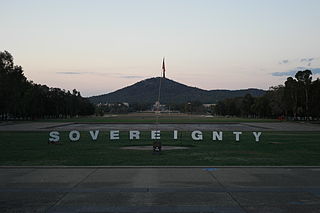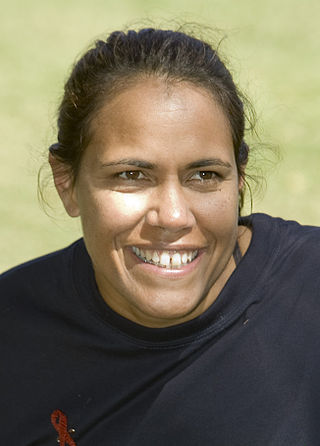Related Research Articles

Wik Peoples v The State of Queensland is a decision of the High Court of Australia delivered on 23 December 1996, on whether statutory leases extinguish native title rights. The court found that the statutory pastoral leases under consideration by the court did not bestow rights of exclusive possession on the leaseholder. As a result, native title rights could coexist depending on the terms and nature of the particular pastoral lease. Where there was a conflict of rights, the rights under the pastoral lease would extinguish the remaining native title rights.

Australian Indigenous sovereignty, also recently termed Blak sovereignty, encompasses the various rights claimed by Aboriginal and Torres Strait Islander peoples within Australia. Such rights are said to derive from Indigenous peoples' occupation and ownership of Australia prior to colonisation and through their continuing spiritual connection to land. Indigenous sovereignty is not recognised in the Australian Constitution or under Australian law.
Native title is the set of rights, recognised by Australian law, held by Aboriginal and Torres Strait Islander groups or individuals to land that derive from their maintenance of their traditional laws and customs. These Aboriginal title rights were first recognised as a part of Australian common law with the decision of Mabo v Queensland in 1992. The doctrine was subsequently implemented and modified via statute with the Native Title Act 1993.
The Wave Hill walk-off, also known as the Gurindji strike, was a walk-off and strike by 200 Gurindji stockmen, house servants and their families, starting on 23 August 1966 and lasting for seven years. It took place at Wave Hill, a cattle station in Kalkarindji, Northern Territory, Australia, and was led by Gurindji man Vincent Lingiari.
Vincent Lingiari was an Australian Aboriginal rights activist of the Gurindji people. In his early life he started as a stockman at Wave Hill Station, where the Aboriginal workers were given no more than rations, tobacco and clothing as their payment. After the owners of the station refused to improve pay and working conditions at the cattle station and hand back some of Gurindji land, Lingiari was elected and became the leader of the workers in August 1966. He led his people in the Wave Hill walk-off, also known as the Gurindji strike.

Kalkarindji is a town and locality in the Northern Territory of Australia, located on the Buntine Highway about 554 kilometres (344 mi) south of the territory capital of Darwin and located about 460 kilometres (290 mi) south of the municipal seat in Katherine.

Erldunda is a pastoral lease that operates as a cattle station 200 km (120 mi) south of Alice Springs in the Northern Territory of Australia.

The Kuku Yalanji, also known as Gugu-Yalanji, Kuku Yalandji or Kokojelandji, are an Aboriginal Australian people originating from the rainforest regions of Far North Queensland.

Curtin Springs, formerly Mount Conner Station, is a pastoral lease operating as a cattle station in the Alice Springs region of the Northern Territory of Australia.

Aboriginal title is a common law doctrine that the land rights of indigenous peoples to customary tenure persist after the assumption of sovereignty to that land by another colonising state. The requirements of proof for the recognition of aboriginal title, the content of aboriginal title, the methods of extinguishing aboriginal title, and the availability of compensation in the case of extinguishment vary significantly by jurisdiction. Nearly all jurisdictions are in agreement that aboriginal title is inalienable, and that it may be held either individually or collectively.
Yamatji is a Wajarri word that has at least two different meanings:
Mordecai "Mordy" Bromberg SC is an Australian judge who was appointed to the Federal Court of Australia in 2009 and as President of the Australian Law Reform Commission in 2023. He was previously a senior barrister, and in his youth also played four seasons of Australian rules football for the St Kilda Football Club.

Sir Richard Arthur Blackburn was an Australian judge, prominent legal academic and military officer. He became a judge of three courts in Australia, and eventually became chief justice of the Australian Capital Territory. In the 1970s he decided one of Australia's earliest Aboriginal Land rights cases. The annual Sir Richard Blackburn Memorial lectures in Canberra commemorate his service to the Australian legal community.
In Australia, Indigenous land rights or Aboriginal land rights are the rights and interests in land of Aboriginal Australians and Torres Strait Islander people; the term may also include the struggle for those rights. Connection to the land and waters is vital in Australian Aboriginal culture and to that of Torres Strait Islander people, and there has been a long battle to gain legal and moral recognition of ownership of the lands and waters occupied by the many peoples prior to colonisation of Australia starting in 1788, and the annexation of the Torres Strait Islands by the colony of Queensland in the 1870s.
Daguragu, previously also known as Wattie Creek by the Gurindji people as it is situated on a tributary of the Victoria River, is a locality in the Northern Territory of Australia. It is located about 551 kilometres (342 mi) south of the territory capital of Darwin and located about 460 kilometres (290 mi) south-west of the municipal seat in Katherine. It is around 8 km (5.0 mi) north-west of Kalkarindji. Daguragu community is situated on Aboriginal land held under perpetual title; it was also formerly a local government area until its amalgamation into the Victoria Daly Shire on 1 July 2008.

Wave Hill Station, most commonly referred to as Wave Hill, is a pastoral lease in the Northern Territory operating as a cattle station. The property is best known as the scene of the Wave Hill walk-off, a strike by Indigenous Australian workers for better pay and conditions, which in turn was an important influence on Aboriginal land rights in Australia.
The Yindjibarndi are an Aboriginal Australian people of the Pilbara region of Western Australia. They form the majority of Aboriginal people around Roebourne. Their traditional lands lie around the Fortescue River.
The Miriwoong people, also written Miriwung and Miriuwung, are an Aboriginal Australian people of the Kimberley region of northern Western Australia.
Debra Sue Mortimer is an Australian judge who has been the Chief Justice of the Federal Court of Australia since 7 April 2023. She was born in New Zealand but has practised law in Australia. She has been a judge of the Federal Court of Australia since 2013, having previously been a Senior Counsel practising at the Victorian Bar in migration law, environmental law and anti-discrimination law.
Pine Hill Station is a pastoral lease that operates as a cattle station in the southern Northern Territory.
References
- 1 2 John Emerson, History of the Independent Bar of South Australia (2006), p. 178.
- ↑ "Former Judges of the Federal Court of Australia". Federal Court of Australia. Retrieved 2022-11-24.
- 1 2 Wellington, Shahni (9 September 2020). "Native Title rights recognised over famous Wave Hill Station". NITV. Special Broadcasting Service . Retrieved 10 September 2020.
- ↑ Bardon, Jane (9 September 2020). "Wave Hill walk-off veterans recognised in 'particularly special' native title determination". ABC News. Australian Broadcasting Corporation. Retrieved 10 September 2020.